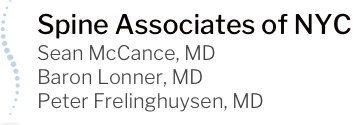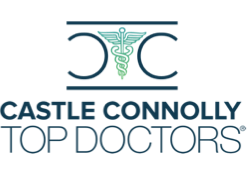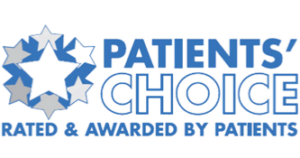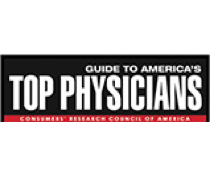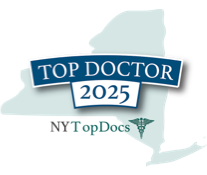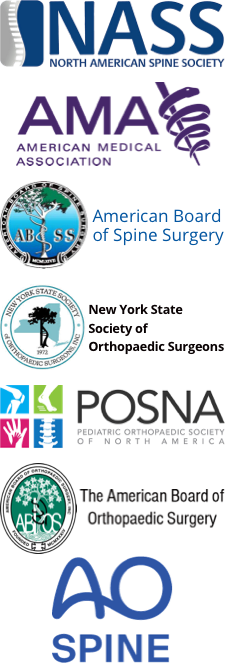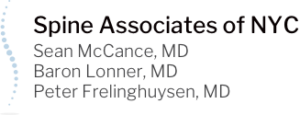Dr. Sean McCance is a best in class NYC herniated disc diagnosis & treatment specialist surgeon (disc herniation of the back and neck) located on the Upper East Side in Manhattan. Discs are small, circular, compressible cushions between the bones in the spine. Discs act as shock absorbers for the vertebrae. When discs in the spine bulge from their proper place, that is called a “herniated disc”. A herniated disc, also called a ruptured disc or slipped disc, occurs when the inner core of the spinal disk pushes out through the outer layer of the disc and compresses a nerve or the spinal cord. This painful condition is most common in the lumbar (lower back) and neck.
When discs lose water content and become flatter, they provide less cushioning which results in pain. If the discs become too weak, the outer part may tear. The inside part of the disc may then push through the tear. This can put the nerves next to the disk under pressure. When this occurs herniated disc surgery may become necessary.
I could not have chosen a better herniated disc surgeon in NYC! His surgical hands worked magic on my spine. I am ever so grateful to him, his P.A. Diana and all the kind hearted and skilled staff who took such great care of me. They are an amazing team and you need not worry. You will be in, “Great hands!” ~ RateMDs
Doctor’s Note: Treatment for many of our patients with a herniated disc may not initially include herniated disc surgery. Some patients will respond to conservative therapy such as medication, rest, physical therapy, and injections. After proper diagnosis, the NYC herniated disc specialist will discuss the options best for your unique case. Dr. Sean McCance will personally discuss the risks and benefits of herniated disc surgery with you and the likely results of surgical versus non-surgical treatment.
The NYC herniated disc diagnosis & treatment doctor can properly diagnose and treat all types of herniated discs. Herniated discs are classified according to where they are found. The common types are:
- Cervical Herniated Discs (in the neck)
- Lumbar Herniated Discs (in the back)
- Thoracic Herniated Discs (the mid-back)
Risk Factors For A Herniated Disc
- Age: 30s and 40s
- The strain on the back either repeated or sudden (as from lifting a heavyweight)
- Certain jobs that require heavy lifting
- Trauma from a fall, accident, or sudden twisting
- Genetics or family history of a herniated disc
Herniated Disc Of The Cervical Spine (Neck)
- Sudden neck or shoulder pain that travels down your arms
- Numbness, tingling, or weakness in one or both arms
- In some cases, weakness in legs, loss of balance, partial or complete paralysis
- Difficulty with fine movements of the hands, such as typing, buttoning a shirt, picking change out of your pocket, writing
- Loss of balance
Herniated Disc Of The Lumbar Spine (Lower Back)
- Pain severity depends on which disk is herniated and the extent of the herniation
- Pain may spread over the buttocks, down the back of one thigh, and into the calf
- Pain may be in one leg (more common) or both legs
- Numbness, tingling, or weakness in the legs or feet
- In severe cases, foot drop (floppy foot control); trouble with bowel or bladder control
Herniated Disc Diagnosis
- The NYC herniated disc specialist, Dr. Sean McCance, will ask about your symptoms and review your medical history
- We will perform a physical exam, focusing on your spine and extremities.
- A new topical exam will be performed.
- The movement, strength, and reflexes of the arms and legs will be tested
- Additional tests may include medical imaging such as X-Rays, MRIs, and CAT Scans.
Herniated Disc Possible Treatments
- Bed rest short term, usually limited to a few days
- Medications
- Anti-inflammatories, nonsteroidal anti-inflammatory drugs (NSAIDs) to reduce inflammation and pain (e.g., Ibuprofen, Naproxen )
- Muscle relaxants to reduce muscle spasms
- Painkillers, such as Vicodin or Percocet if the pain is severe
- Steroids, such as the Medrol dose pack
- Hot or cold packs to reduce pain and muscle spasms
- Physical Therapy: during the acute phase, physical therapy is used to:
- Relax the neck or back muscles and back spasms
- Decrease pain
- Increase strength and mobility
- Strengthen the back and abdominal muscles
- Chiropractic:
- A chiropractor can help reduce acute pain by stretching your spine and applying various treatments such as traction or manipulation.
- Any spinal manipulation must be done carefully by an experienced, licensed practitioner.
- Traction (manual or with pulleys) to relieve pressure on the discs (more common for discs in the neck area).
- Neck collar or brace for a herniated disc to relieve muscle spasms.
- Epidural Steroid Injections (ESI)
- Steroid injections into the area around the nerve and disc, which are done to reduce pain and inflammation of the compressed nerve. The injections are used if other medications do not work, and are performed by a specialist.
Herniated Disk Surgery
- Herniated disc surgery may be used for people who fail to respond to other treatments. There are different surgical options depending on the type of herniation.
- Microdiscectomy removal of fragments of the herniated disk through a small incision – this is the most common treatment for a herniated disk.
- Laminectomy removal of some of the bone over the nerve and of the problem disk.
- Spinal fusion surgery – the fusing of vertebrae (back or neck bones) together with bone grafts and metal rods/plates (this spinal surgery is intended for more extreme cases).
Contact the Upper East Side NYC herniated disc specialist if your back or neck pain:
- Is severe or gets significantly worse
- Spreads down your legs or arms
- Causes difficulty walking, standing, or moving
- Is associated with:
- Numbness, weakness, or tingling in your arms or legs
- Loss of bowel or bladder control
- Difficulty with urination
- Fever, unexplained weight loss, or other signs of illness
- Has not started to improve within 7 to 10 days
- Is worse at night, or worse when you lie down
Our best in class, Upper East Side, NYC back & neck pain diagnosis & surgery practice, Spine Associates, is honored to provide you with highly personalized and comprehensive care. Our philosophy of direct management of your case by an expert spine surgeon has made us one of the most trusted and respected spine surgery practices on the Upper East Side in NYC and the world. Feel free to contact the back & neck pain diagnosis and spine surgery specialist today to discuss your unique condition and start yourself on the road to recovery.
Dr. Sean McCance
1155 Park Avenue, Suite E
New York, NY 10128
(212) 360-6500
